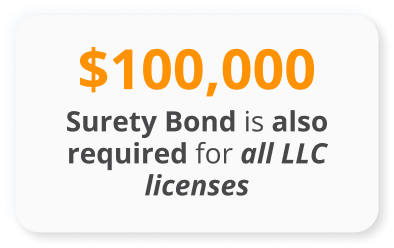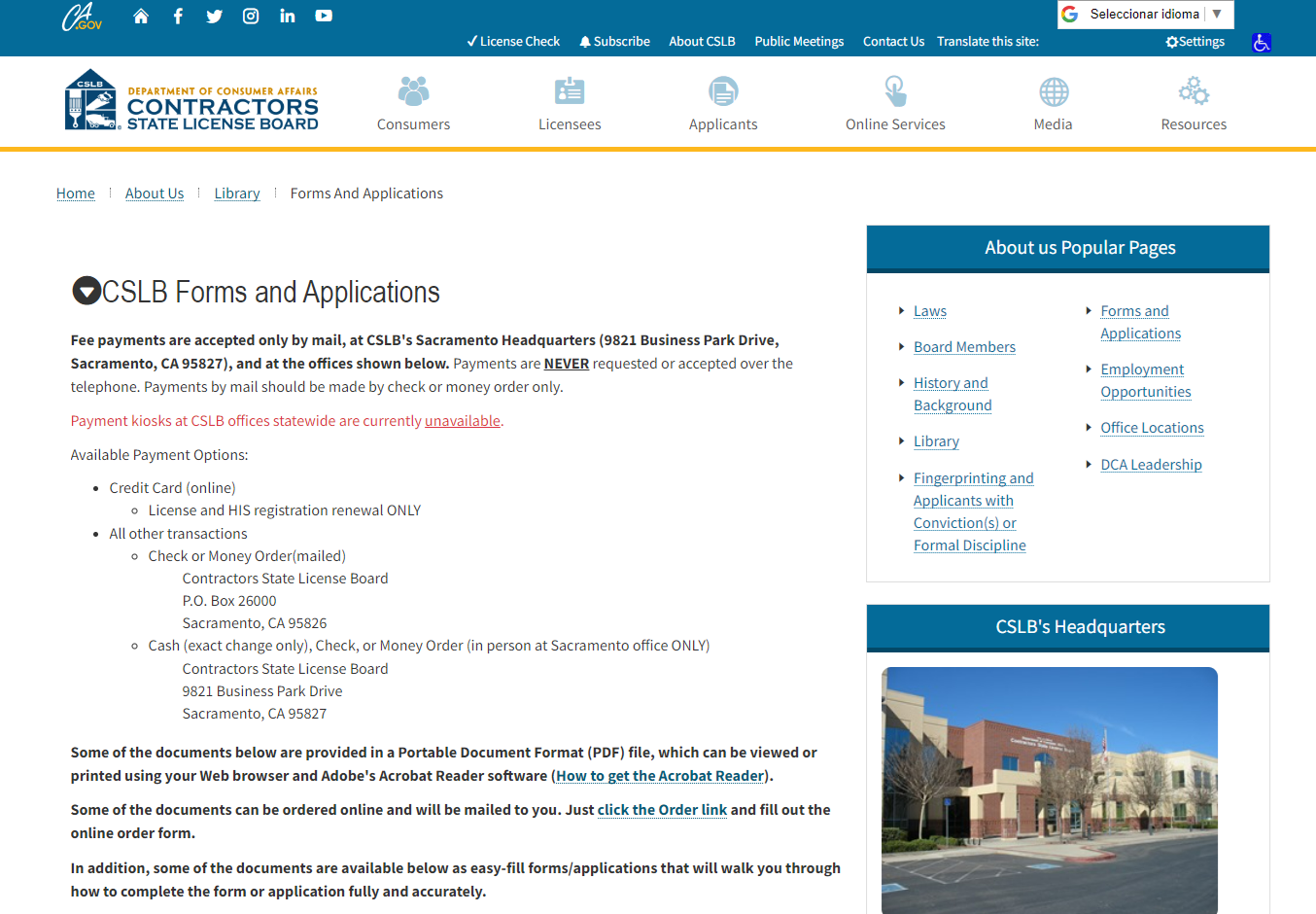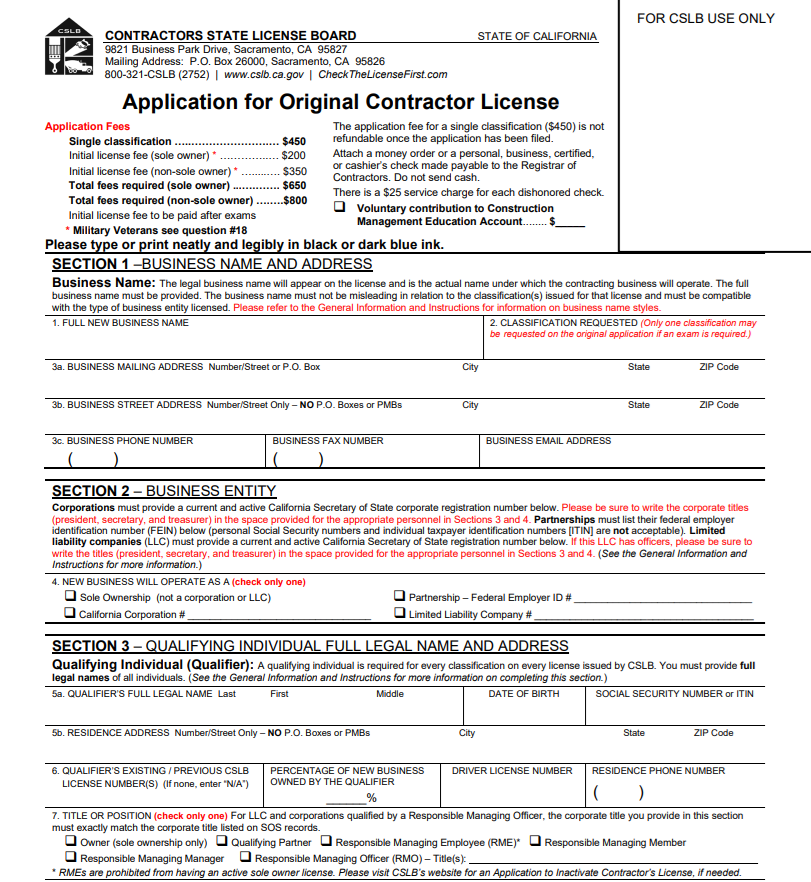Unlocking California’s Construction Potential: Your Guide to the General Contractor License
Are you considering becoming a general contractor in California? If so, it’s essential to understand the licensing requirements in order to operate legally in the state. In this article, we’ll delve into the California general contractor license requirements, providing you with the information you need to kickstart your construction career.
Navigate the ins and outs of obtaining a General Contractor License in California. From prerequisites to benefits, this comprehensive guide has you covered.
For information on contractor licenses in California, you can refer to the California Contractors State License Board (CSLB).
Contact Information:
Web: California Contractors State License Board (CSLB)
Alternate Phone Number: 512-463-6599 (For calls outside Texas)
Alternate Phone Number: 512-463-6599 (For calls outside Texas)
Phone: 1-800-321-CSLB (2752)
Alternate Phone Number: 512-463-6599 (For calls outside Texas)
Alternate Phone Number: 512-463-6599 (For calls outside Texas)
Address:
Main Office: 9821 Business PD, Sacramento, CA 95827
Mailing Address: P.O. Box 26000, Sacramento, CA 95826
For more detailed information or specific inquiries, visit: California Contractors State License Board (CSLB)
California General Contractor License Requirements
Applicants with one or more employees must provide a certificate of insurance verifying workers’ compensation insurance coverage. Liability insurance, with an aggregate limit of $1 million, for licenses with five or fewer persons listed as personnel; plus an additional $100,000 for each additional personnel listed on the license; not to exceed $5 million total (LLC licenses only).
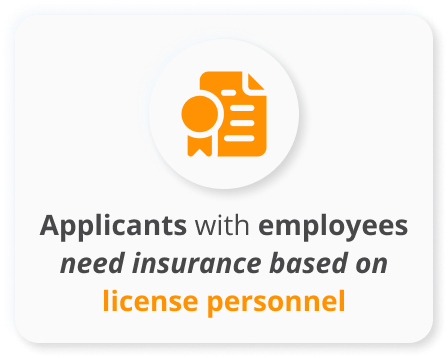
Insurance Requirements for General Contractor License Applicants in California:
- Workers’ Compensation Insurance:
- Who Needs It? All applicants who have one or more employees.
- Purpose: This insurance ensures that if an employee gets injured on the job, their medical expenses and lost wages will be covered.
- Documentation: Applicants must provide a certificate of insurance as proof of workers’ compensation insurance coverage.
- Liability Insurance:
- Who Needs It? This requirement is specific to LLC licenses.
- Coverage Limits:
- For licenses with five or fewer persons listed as personnel: The aggregate limit should be $1 million.
- For each additional personnel listed on the license beyond the initial five: An additional coverage of $100,000 is required.
- Maximum Coverage Limit: The total liability insurance coverage should not exceed $5 million, regardless of the number of personnel listed on the license.
- Purpose: Liability insurance protects the licensed entity from claims resulting from injuries and damages to other people or property.
Bonding Requirements for Contractors in California:
- Contractor’s Bond:
- Amount: $15,000
- Who Needs It? All contractors operating in California.
- Purpose: This bond is a financial guarantee that contractors will adhere to the regulations and standards set by the state. It serves as a protection for consumers against potential financial loss due to a contractor’s failure to complete a job as agreed or any other contractual breaches.
- Where to File: The bond must be on file with the California Contractors State License Board (CSLB).
- Qualifying Individual’s Bond:
- Amount: $12,500
- Who Needs It? Contractors that are qualified by a responsible managing employee. This is in addition to the standard contractor’s bond.
- Purpose: This bond ensures that the responsible managing employee upholds their duties and responsibilities in line with state regulations. It provides an added layer of protection for consumers when a managing employee is the qualifying individual for the contractor license.
- Where to File: Just like the contractor’s bond, this bond must also be filed with the CSLB.
All LLC licenses are required to obtain a $100,000 surety bond as well. This bond requires financial statements and excellent credit to obtain. If you are just starting out this can be very difficult and expensive to obtain. You should look into the possibility of forming some other type of entity. Advice of an attorney is advised.
Qualifying Experience for a General Contractor License
One of the key requirements for obtaining a general contractor license in California is having the necessary qualifying experience. The CSLB requires applicants to have at least four years of experience working in the construction industry. This experience must be within the last ten years and in a supervisory role, where you were responsible for critical construction decisions.
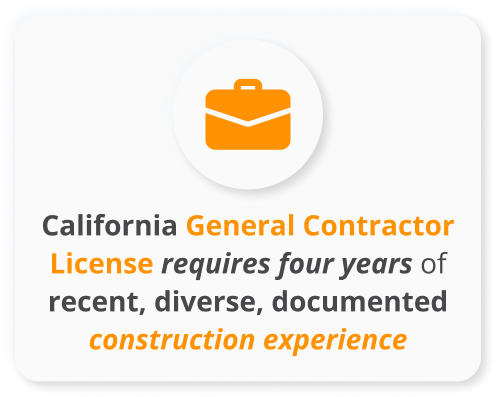
It’s important to note that the CSLB defines experience broadly, allowing for a combination of various types of construction-related work to meet the requirements. This can include experience gained through employment, self-employment, apprenticeship programs, or even military service. However, it’s crucial to provide detailed documentation of your experience, including references, job descriptions, and proof of employment, to support your application.
Application Process for a General Contractor License
The application process for obtaining a general contractor license in California involves several steps. First, you need to complete and submit the license application form, along with the required supporting documents. These documents typically include proof of qualifying experience, educational qualifications, and financial responsibility.
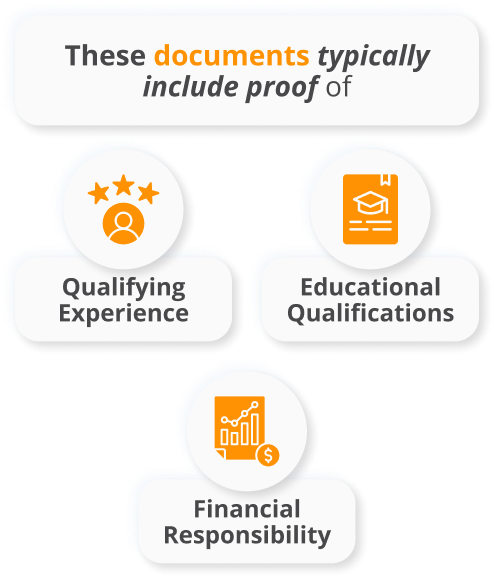
Once your application is submitted, the CSLB will review it to ensure that you meet all the requirements. This review process may take several weeks or even months, depending on the workload of the CSLB. It’s important to be patient during this stage and to provide any additional information or documentation requested by the CSLB promptly.
Exam Preparation for the General Contractor License
Passing a licensing exam is a critical requirement for obtaining a general contractor license in California. The CSLB administers a standardized exam that assesses your knowledge and understanding of construction laws, regulations, and best practices. It’s essential to dedicate time to prepare for the exam to increase your chances of success.
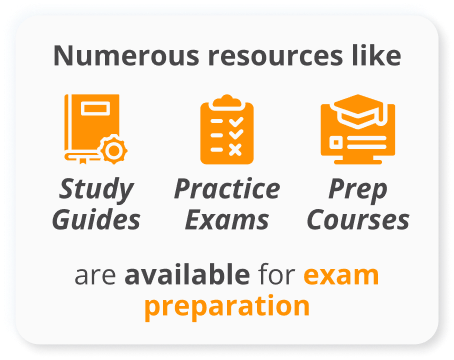
There are various resources available to help you prepare for the licensing exam. These include study guides, practice exams, and exam prep courses. Additionally, networking with other licensed contractors or joining industry associations can provide valuable insights and study resources.
Examination Requirements for Contractor License Qualifiers in California:
- Law and Business Exam:
- Who Needs It? Every qualifier for a contractor license in California.
- Purpose: This exam assesses the qualifier’s understanding of California’s laws and business practices related to the construction industry. It ensures that contractors operate ethically, legally, and are well-versed in the state’s business regulations.
- Trade Exam:
- Who Must Take It? The qualifier for a contractor license, unless they are eligible for an exam waiver based on specific criteria set by the state.
- Purpose: The trade exam evaluates the qualifier’s technical knowledge and skills in their specific trade or field of construction. It ensures that contractors have the necessary expertise to execute projects safely and efficiently.
- Exceptions:
- C-61 Limited Specialty License: Qualifiers for this particular license are exempt from taking the trade exam. The C-61 license covers specific, limited specialty fields within the construction industry.
- Exam Waiver:
- Eligibility: Some qualifiers might be eligible for a waiver from taking one or both exams. The waiver criteria can include factors like prior experience, previous licensure, or other state-recognized credentials.
- Purpose: The waiver system acknowledges the expertise of individuals who have demonstrated their proficiency in the trade or have met specific state requirements, eliminating the need for redundant testing.
Maintaining and Renewing a General Contractor License in California
Once you have obtained your general contractor license in California, it’s important to understand the requirements for maintaining and renewing it. The CSLB requires licensed contractors to renew their licenses every two years. To renew your license, you must complete a renewal application and pay the required fee.
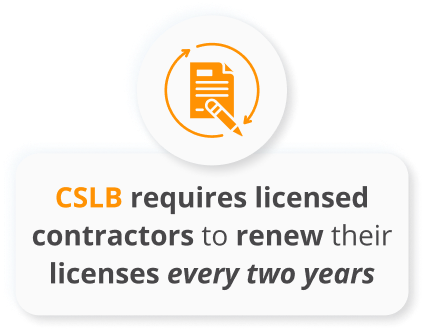
In addition to license renewal, you are also responsible for maintaining your license by complying with certain obligations. This includes obtaining and maintaining valid liability insurance and worker’s compensation coverage. Failure to meet these obligations can result in the suspension or revocation of your license.
Access California Contractor License Application Forms
To access California Contractor License Application Forms, you can visit the website of the Contractors State License Board (CSLB) at https://www.cslb.ca.gov/
The following are the most common contractor license application forms:
- Application for Original Contractor License (Form 13A-1A)
- Certification of Work Experience (Form 13A-3)
- Construction Project Experience (Form 13A-4)
- Disclosure Statement Regarding (Form 13A-5)
- Accommodation Requests for Examination (Form 13A-6)
You may also need to complete additional forms, depending on the specific type of contractor license you are applying for. For example, if you are applying for a license to perform asbestos-related contracting, you will also need to complete the Asbestos Certification Application (Form AC-1).
Once you have downloaded the necessary forms, you can complete them electronically or print them out and fill them in by hand. Once you have completed the forms, you will need to mail them to the CSLB, along with the required application fee and any other supporting documentation.
Please note that the Contractors State License Board (CSLB) also offers a variety of online services to help you with the contractor license application process. For example, you can create an online account to track the status of your application and view your license information. You can also use the CSLB’s online database to find licensed contractors in your area.
Required documents for the application
In addition to the completed application forms, you will need to provide various supporting documents to demonstrate your eligibility for a contractor license in California. The specific documents required may vary depending on your license classification and individual circumstances. However, some common documents that you may need to include are:
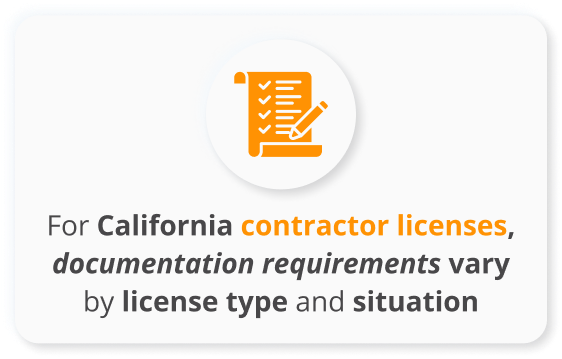
- Proof of work experience: You will need to provide documentation, such as pay stubs, tax returns, or employer verification letters, to substantiate your work experience.
- Proof of education: If you have completed any formal education or training programs related to the construction industry, you will need to provide copies of your certificates or transcripts.
- Financial statements: The CSLB requires applicants to submit financial statements, such as balance sheets and income statements, to demonstrate their financial stability.
- Proof of insurance: You will need to obtain liability insurance coverage and provide proof of insurance to the CSLB.
- Contractor’s bond: A contractor’s bond is a form of financial guarantee that protects clients in case of any issues with the contractor’s work. You will need to obtain a contractor’s bond and provide proof of the bond to the CSLB.
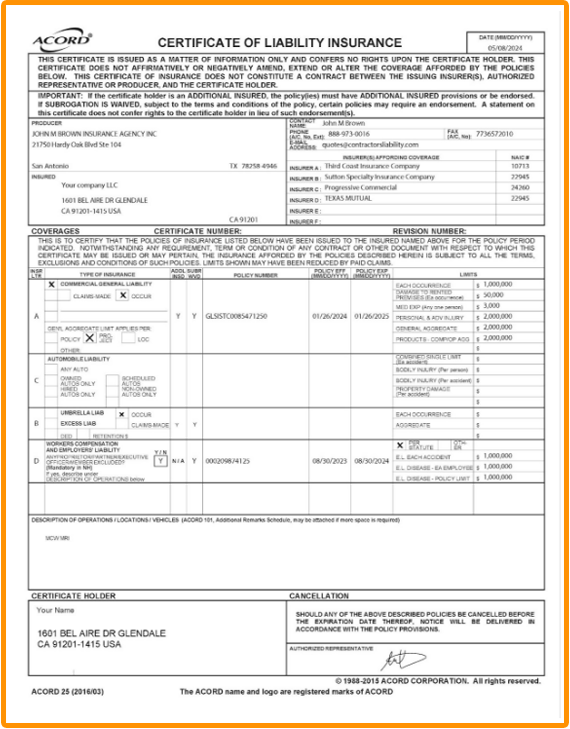
- Identification documents: You may be required to provide copies of your driver’s license, passport, or other identification documents to verify your identity.
It’s essential to review the CSLB’s website and carefully read the application instructions to determine the specific documents required for your license classification. Make sure you gather all the necessary documents and organize them in a clear and concise manner before submitting your application.
How long does it take to process a contractor license application?
The processing time for a contractor license application in California can vary depending on various factors, including the volume of applications received and the completeness of your application. On average, the CSLB aims to process applications within 12 to 16 weeks.
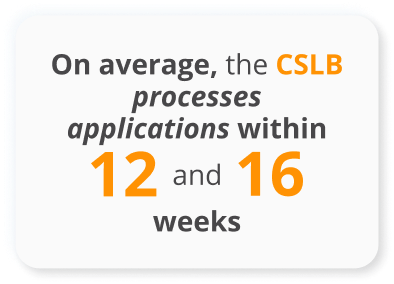
To expedite the processing time, it’s crucial to submit a complete and accurate application, including all the required supporting documents. Any errors or omissions in your application can result in delays as the CSLB may need to request additional information or clarification.
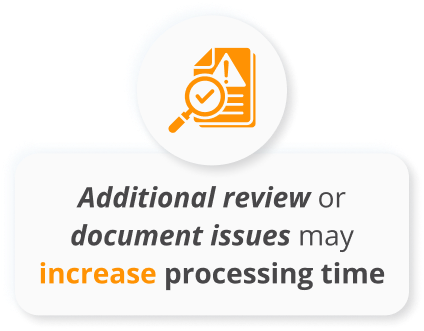
It’s important to note that the processing time may be longer if your application requires additional review or if there are any issues with your documentation. Therefore, it’s advisable to submit your application well in advance of any project deadlines to allow for sufficient processing time.
| Insurance Type | Coverage | Typical Coverage Limits | Estimated Annual/Cost |
|---|---|---|---|
| General Liability Insurance | Property damage, bodily injury, personal injury | $1 million per occurrence; $2 million aggregate | $800 – $3,000 |
| Workers’ Compensation Insurance | Medical expenses, lost wages for employees | Varies based on payroll and risk level | $3,000 – $10,000 |
| Commercial Auto Insurance | Liability and physical damage for business vehicles | Varies based on vehicle and use | $1,500 – $4,000 per vehicle |
| Professional Liability Insurance | Negligence, errors, omissions in professional services | Varies based on services and coverage limits | $1,000 – $4,000 |
| Surety Bonds | Guarantees contractual obligations | $15,000 bond amount | 1% – 15% of bond amount ($150 – $750) |
Frequently Asked Questions (FAQ)
These are common questions about General Contractor License in California.
A General Contractor License in California allows professionals to oversee, coordinate, and execute construction projects within the state. This license ensures that contractors meet the state’s standards for safety, ethics, and expertise.
To legally operate as a general contractor in California, obtaining this license is mandatory. It ensures that you have the necessary qualifications and adhere to the state’s regulations, providing confidence to clients and protecting consumers.
The application process involves meeting specific educational and experience requirements, passing an examination, and providing proof of insurance. Detailed steps can be found in our comprehensive guide.
If you have employees, you must provide a certificate verifying workers’ compensation insurance coverage. For LLC licenses, liability insurance requirements vary based on the number of personnel listed, with details available in our article.
Renewal frequency and requirements can vary. It’s essential to stay updated with the California Contractors State License Board (CSLB) guidelines to ensure continuous licensure.


